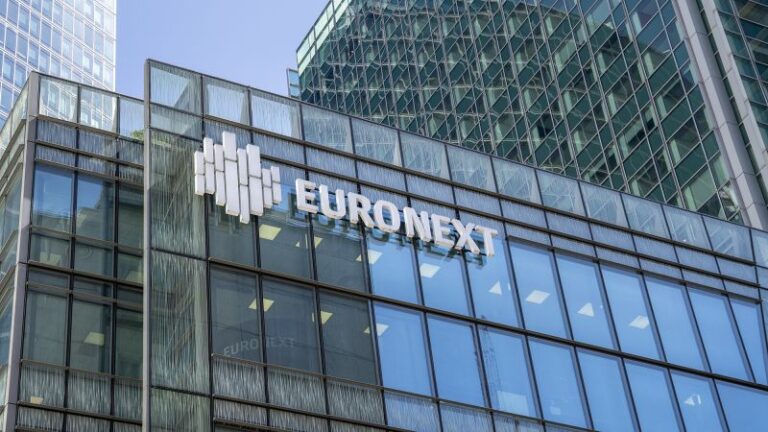Antoine Breault/Hans Lucas/AFP/Getty Images
The Euronext building in Paris, which houses the Paris Stock Exchange (June 2024).
London
CNN
—
French shares and the euro rose on Monday after first-round election results suggested the far-right party handed President Emmanuel Macron a heavy defeat but fell short of winning a majority in parliament.
France’s CAC 40 index, which represents the 40 largest companies listed in Paris, rose 2.7% at the start of trading. The index closed up 1% but is still nearly 6% below its level before President Macron called general elections on June 9.
Bank stocks, an economic gauge, recovered from steep declines in recent weeks, with BNP Paribas shares up 3.6 percent, while Societe Generale and Credit Agricole rose 3.1 percent and 2.8 percent, respectively.
The euro, which fell sharply after Macron’s surprise election announcement, briefly hit its highest level in more than two weeks against the dollar on Monday.
Yields on French government bonds – the return investors demand for the risk they hold – were little changed after expanding sharply in recent days versus ultra-safe German government bonds. On Friday, the risk premium over German government bonds hit its highest level since the euro zone crisis more than a decade ago.
While a Macron defeat would likely be bad news for France’s shaky finances — a hanging parliament could mean gridlock — the worst-case scenario for investors appears to have receded. Just two weeks ago, investors were worrying that France could face a financial crisis similar to the 2022 British market crash sparked by underfunded tax cuts pushed through by former Chancellor Liz Truss.
Turnout was unusually high on Sunday, with Marine Le Pen’s far-right National Rally party coming in first in the first round with 33.15% of the vote, while the left-wing New Popular Front coalition came in second with 27.99%. Macron’s Ensemble coalition languished in third place with 20.76% of the vote, according to final results released by the French Interior Ministry on Monday.
“The outcome is perhaps better than feared (for markets), but not as good as the three weeks before the election,” Mohit Kumar, chief European economist at Jefferies, wrote in a Monday note. “The immediate reaction is a relief rally.”
Going into the first round of voting, investors were concerned that voters would elect a far-right or far-left parliament promising increased spending, further increasing already high debt and the budget deficit (the difference between how much the government spends and how much it receives in taxes).
As of the end of last year, France’s government debt stood at 110.6% of gross domestic product, and its budget deficit reached 5.5% of GDP, the highest among the 27 European Union countries.
Sunday’s vote may have eased the risks of extreme fiscal policy in Europe’s second-largest economy, but investors remain concerned that a divided new parliament will be unable to tackle the country’s debt problems.
“The stalled reform process could lead to political paralysis in France for years to come,” Kumar said, referring to Macron’s policies aimed at spurring economic growth.
Several other analysts also see a “hung parliament,” in which no single party wins a majority, as the most likely outcome.
That could result in a “stalemate,” according to Berenberg chief economist Holger Schmieding. “In this case, a new government coming into power would not achieve much,” he wrote in a Monday note.
Things would be worse than deadlock if Le Pen’s National Rally were to join forces with parts of the left to cut taxes and reverse some of Macron’s reforms, such as raising the retirement age to 64 for most workers.
The National Coalition has promised to reduce value-added tax on electricity, fuel and other energy products from 20 percent to 5.5 percent. Meanwhile, the left-leaning New Popular Front has promised to raise the minimum wage and freeze the prices of many basic goods.
In a third scenario, called “Marine Meloni”, Schmieding said Le Pen could follow the example of Italian Prime Minister Giorgia Meloni and focus on key policies such as a tough stance on immigration while watering down “more costly and confusing fiscal commitments” in order to win the 2027 presidential election.
“The three main scenarios above imply a gradual deterioration in France’s prospects… but do not suggest an immediate Liz Truss-type crisis,” he said.
In the longer term, some of Macron’s reforms could be partially reversed, economic growth could slow and inflation could rise.
“Combined with a possible (credit) rating downgrade, this will increase financing costs and exacerbate France’s fiscal problems in the long term,” he added.
Ratings agency S&P downgraded the French government’s credit rating in May, citing a “deteriorating fiscal position,” but believes the country still has sufficient capacity to repay its debts.
The outcome of the French election remains uncertain, with the final vote scheduled for July 7, and it is still possible that Le Pen’s National Rally will win a majority.
“It is doubtful whether this morning’s improvement in sentiment will be sustained heading into the next vote,” Rabobank analysts wrote in a note.
Anna Cuban contributed reporting. This story has been updated with additional information.

